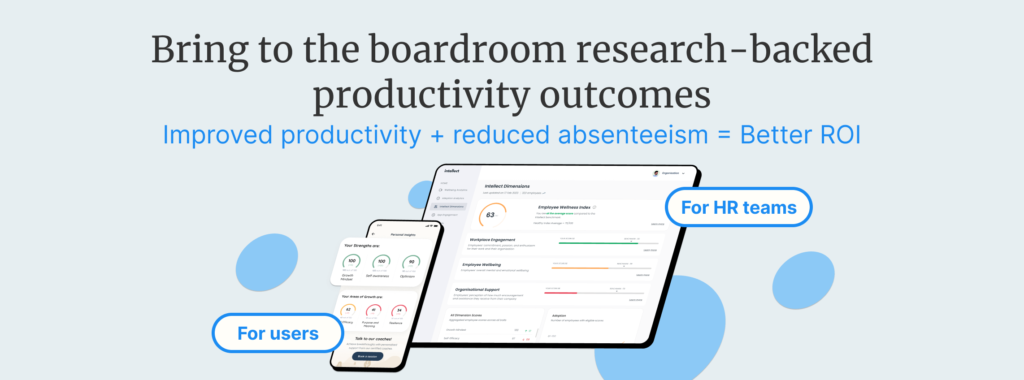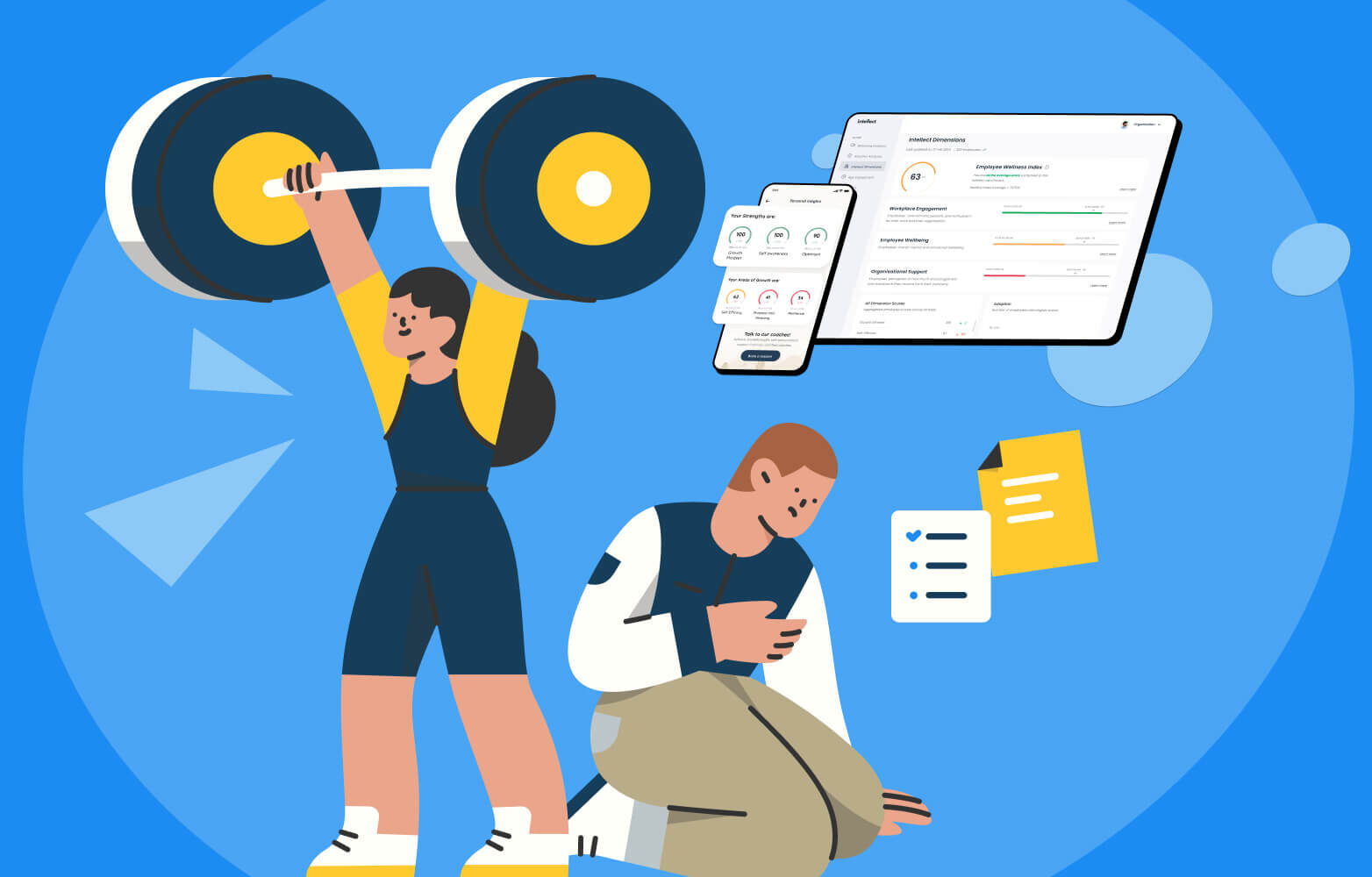Ever wondered how your workforce is truly faring? Despite the significant attention mental wellbeing has received in the HR world, quantifying these intangible aspects has proven challenging. Translating “good vibes” into concrete business outcomes and measuring the impact of a “toxic culture” with only anecdotal evidence is no simple task.
It is for this very reason that Intellect Dimensions (also known as Personal Insights on our app) was born last year. This proprietary 26-item measurement framework has undergone rigorous validation through Intellect’s clinical study, encompassing a sample size of 1001 working adults in Singapore.

Now, that might sound like a lot to digest, and we’d absolutely love to geek out with you about it at a later time. But, for now, we’re thrilled to share some findings between December 2022 and June 2023: the primary strengths and noteworthy observed in employees in Asia.
Top strengths of employees in Asia
1. Self Awareness
Definition: Extent to which you are connected to and understand your thoughts, emotions, and behaviours.
A self-aware employee is one who not only knows the ins and outs of their work but is also deeply in tune with their own thoughts, emotions, and behaviours. By understanding their strengths and weaknesses, they can make better decisions in the workplace and grow as an individual, especially if they decide to explore these aspects through coaching, counselling, or psychotherapy.
For instance, after some serious introspection, a self-aware manager may realise that her perfectionist tendencies are doing more harm than good to her team’s morale, and work on managing her own expectations or trusting her team members more.
2. Relationship Building
Definition: Level of support you receive from social connections and the ability to build and maintain secure relationships with people you are close to.
In the collectivist cultures prevalent in Asian workplaces, relationship-building assumes a central role in determining an individual’s professional success. Cultivating meaningful connections fosters an environment of trust, cooperation, and support, all of which are critical for personal and organisational growth.
A manager who thrives in the art of relationship-building may invest time in getting to know each team member on a personal level, creating a safe space for open conversations about their mental health. As remote work arrangements give rise to miscommunication, their strong relationships may also help them to navigate conflict and emerge stronger as a cohesive team.

3. Encouraging Participation
Definition: Ability to engage in inspiring behaviours, support your team, and foster a culture of openness and inclusion.
In the current landscape, the spotlight shines brightly on two critical elements: psychological safety and diversity, equity, and inclusion (DEI). More than offering employees a safe space to work, these intertwined aspects also have the potential to create a culture of creative problem-solving and deep belonging within the organisation.
Have you ever found yourself in a brainstorming session so quiet you could hear crickets chirping? The absence of a leader who excels in encouraging participation is palpable. This adept figure ensures that every team member, whether they’re a senior employee or an intern, feels at ease speaking up. By actively and non-judgmentally listening to diverse inputs, they foster a heightened level of engagement and instil a shared sense of ownership over the collective goals.
Common areas for improvement
1. Mental Wellbeing
Definition: Ability to feel energised and confident to achieve your goals. Individuals high mental wellbeing scores are less likely to experience anxiety or depression.
In a recent 2022 study conducted by McKinsey, a concerning trend has emerged in the Asia Pacific region – workers are facing an alarming surge in burnout rates. Shockingly, one in every three employees in Asia report feeling burnout, a significant increase compared to the global average of one in four.
In light of this burnout epidemic, the importance of self-care has never been more apparent. However, self-care extends beyond the stereotypical mental health days and vacations. It entails fostering a supportive environment where employees can connect with trained mental wellness ambassadors in the workplace or mental health professionals outside the organisation.

2. Emotion Regulation
Definition: Ability to regulate your emotional responses during challenging situations.
In the heat of emotional moments, our decision-making abilities and interpersonal interactions can suffer the consequences. Take, for instance, a manager who receives criticism from higher management and reacts defensively, allowing emotions to drive their response during the meeting. This not only compromises their credibility as a leader but also leaves team members feeling disheartened.
The good news? Emotion regulation is a skill that can be honed with practice. Employees can become more adept at recognising their emotional triggers and practising mindfulness before reacting. Simple techniques like deep breathing or grounding oneself can be powerful tools to maintain composure during emotionally charged situations.
These exercises are available on Intellect’s platform, where users can access features informed by Cognitive Behavioral Therapy (CBT) to recognise and modify unhealthy thought and behaviour patterns. In fact, engagement with Intellect for once a week significantly predicts greater psychological resilience the following day.
3. Stress Management
Definition: Extent to which you are equipped to cope with challenging situations.
Consider an ambitious sales executive determined to meet aggressive monthly targets. As the pressure mounts over an extended period, their mental and physical well-being starts to suffer, leading to sleep disturbances and heightened stress levels.
Surprisingly, this scenario is not uncommon, as revealed by a survey conducted by Intellect across seven APAC countries with over 880 respondents. 51% of the participants reported feeling stressed, with an ongoing struggle to maintain healthy sleep patterns.
You may ask, what’s the difference between emotion regulation and stress management? Emotion regulation is like tending to the daily weather, addressing the moment-to-moment fluctuations in our emotional states. On the other hand, stress management deals with the climate, focusing on longer-term strategies to cope with the seasonal changes of life’s pressures.
For the daily emotional rollercoaster, emotion regulation comes into play. Stress management, on the other hand, consists of long-term strategies to weather the storms of corporate life successfully. These may include setting boundaries, using social media more mindfully, establishing a healthy work-life balance, and making self-care an everyday priority.

How Intellect Dimensions can help
Did you know that untreated mental health problems cost businesses across the globe $44 billion per year?
Back in 2014, ACAS (a UK organisation) reported that mental health issues caused a massive loss of 72 million working days each year, costing a staggering £34.9 billion annually. What’s even more surprising is that employees showing up for work while unwell (instead of taking time off to recover) costs businesses twice as much as when they are absent altogether.
Here’s the exciting part: using the Intellect App for just 8 weeks can make a difference. The average user experienced a boost in productivity by 7.6 days and a reduction in absenteeism by 6 days each year. That’s not all – adopting Intellect as a mental wellbeing solution can bring in an impressive Return on Investment (ROI) ranging from 5 to 12 times, and that’s a conservative estimate.

With Intellect Dimensions, organisations can effectively track the mental health wellness of their workforce and provide scientifically-backed ROI metrics for their wellbeing programs with Intellect.
Learn more about Intellect here.








